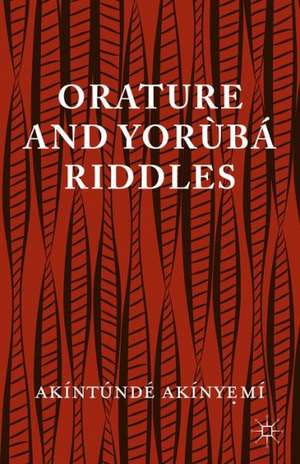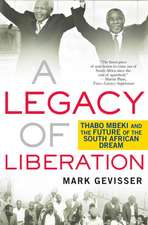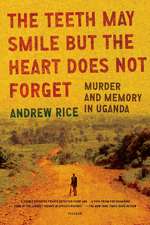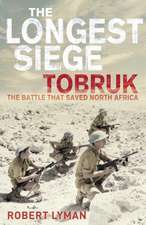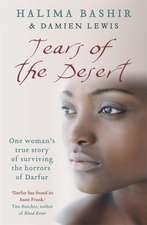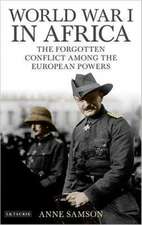Orature and Yoruba Riddles
Autor A. Akinyeme, Kenneth A. Loparoen Limba Engleză Hardback – 24 apr 2015
Preț: 390.46 lei
Nou
Puncte Express: 586
Preț estimativ în valută:
74.71€ • 78.01$ • 61.70£
74.71€ • 78.01$ • 61.70£
Carte tipărită la comandă
Livrare economică 15-29 aprilie
Preluare comenzi: 021 569.72.76
Specificații
ISBN-13: 9781137502629
ISBN-10: 1137502622
Pagini: 280
Ilustrații: XVIII, 261 p.
Dimensiuni: 140 x 216 x 18 mm
Greutate: 0.47 kg
Ediția:2015
Editura: Palgrave Macmillan US
Colecția Palgrave Macmillan
Locul publicării:New York, United States
ISBN-10: 1137502622
Pagini: 280
Ilustrații: XVIII, 261 p.
Dimensiuni: 140 x 216 x 18 mm
Greutate: 0.47 kg
Ediția:2015
Editura: Palgrave Macmillan US
Colecția Palgrave Macmillan
Locul publicării:New York, United States
Cuprins
Introduction 1. Yoruba Riddles in Performance: Content and Context 2. Riddles and Metaphors: The Creation of Meaning 3. The Dynamics of Tale-Riddling 4. The Variability and Function of Song-riddle 5. Current Trends in the Use of Enigmatic Forms 6. Orature and Indigenous Education
Notă biografică
Akintunde Akinyeme is Associate Professor in the Department of Languages, Literatures, and Cultures, at the University of Florida, USA.
Textul de pe ultima copertă
Orature and Yorùbá Riddles takes readers into the hitherto unexplored undercurrents of riddles in Africa. Because of its oral and all too often ephemeral nature, riddles have escaped close scrutiny from scholars. The strength of the Yorùbá as the focus of this study is impressive indeed: a major ethnic group in Africa, with established connections with the black diaspora in North America and the Caribean; a rich oral and written culture; a large and diverse population; and an integrated rural-urban society. The book is divided into six chapters for readers' convenience. When read in sequence, the book provides a comprehensive, holistic sense of Yorùbá creativity where riddles are concerned. At the same time, the book is conceived in a way that each chapter could be read individually. Therefore, those readers seeking understanding of a specific type of riddle may target a single chapter appearing most relevant to her/his curiosity.
